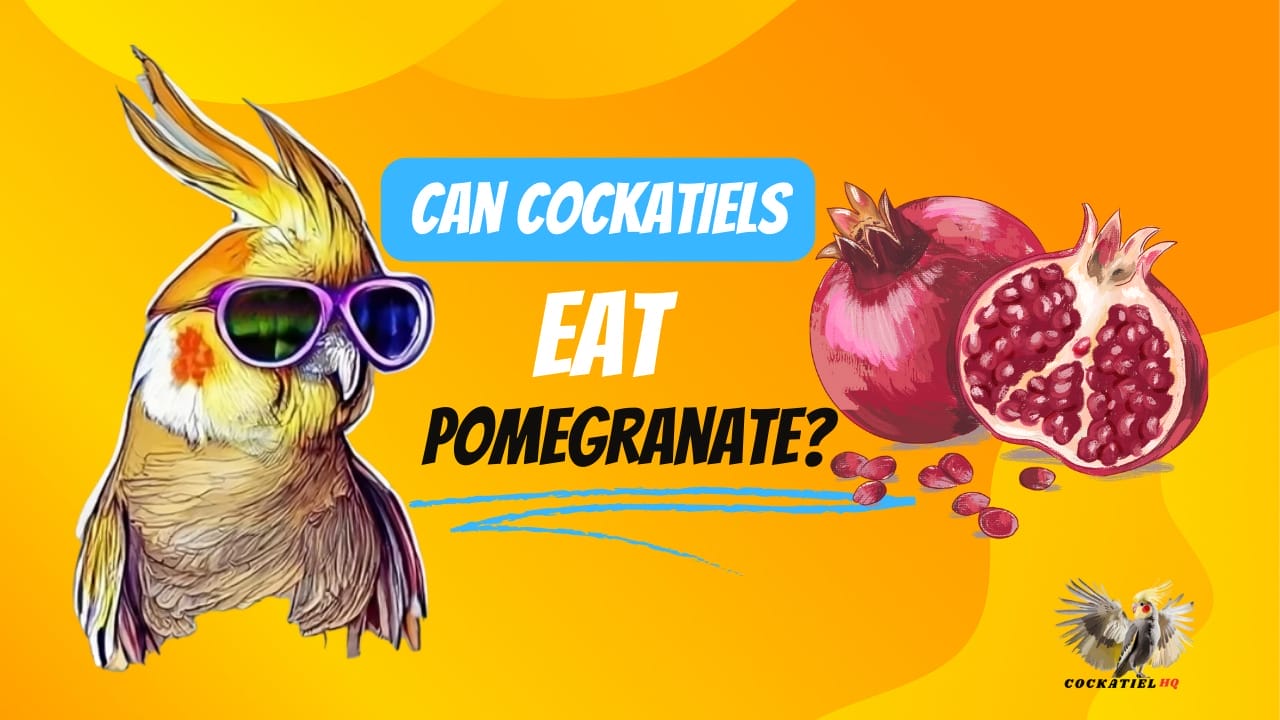Feathered Treats: Can Cockatiels Eat Pomegranates?
Introduction: Diet and Cockatiels
A. Understanding Cockatiel’s Dietary Needs
While it’s a common stereotype that birds are seed eaters, cockatiels demand a more complex diet to meet their nutritional needs. Just like us humans who go ga-ga over a rainbow-colored salad or a fruit platter, these charming little birdies thrive on a balanced diet, which includes pellets, vegetables, fruits, and a controlled amount of seeds. These tiny featherballs need a variety of nutrients including proteins, vitamins, carbs, and minerals that combine to orchestrate their overall health dance. So, as a cockatiel parent, you may have to act like a diet detective and occasionally play the role of a culinary explorer, seeking out new flavorful treats for your little feathered friends.
B. Myths and Misconceptions About What Cockatiels Can Eat
Believe it or not, there’s a bunch of gabble out there on what cockatiels can and cannot eat. The “All-seeds diet” is probably the Titanic of all myths. It’s a nutritional nightmare that can lead your cockatiel to a host of health problems due to the lack of essential vitamins and minerals. Another alluring illusion is that “Birds instinctively know what’s harmful to them”. Well, think again! Cockatiels, as much as we love their adventurous spirit, lack the judgment required to differentiate between safe and dangerous foods. So, the dietary reins are pretty much in your hands!
C. Importance of Nutritional Variety for Cockatiels
Just imagine eating grilled chicken for breakfast, lunch, and dinner. Sounds, monotonous. Similarly, your cockatiel would appreciate a flavorful and colorful variety in their food bowl. Different fruits, veggies, and grains provide an array of nutrients that contribute to your birdie’s well-being and also keep them mentally stimulated.
Exploring Pomegranates: Nutritional Facts and Health Benefits

A. Pomegranate: A Nutritional Overview
Now, let’s shine the spotlight on the star of the show: Pomegranates. This ruby-red fruit has been gracing our kitchen counters and dinner tables for centuries, earning the reputation of a dietary powerhouse. Pomegranates are chock-full of fiber, proteins, antioxidants, and many imperative vitamins and minerals, including Vitamin C, Vitamin K, folate, and potassium.
B. Health Benefits of Pomegranates in General
Power-packed with numerous health benefits, pomegranates have taken the health community by storm. Their impressive antioxidant content fights off free radicals, reducing the risk of chronic diseases. Furthermore, they’re known to boost heart health and offer anti-inflammatory effects. The high fiber content aids in improving digestion, making pomegranates a treasure trove of health-enhancing nutrients.
C. Pomegranates & Human Consumption
To humans, pomegranates are a treat to the palate and a boon to health. Consumed raw, as a juice, or even integrated into a range of dishes, these multifaceted fruits are a gastronomical delight. But, as a dedicated bird parent, a natural question arises, “Can my cockatiel share the pomegranate pleasure?“
Can Cockatiels Consume Pomegranates? Unraveling the Truth

A. Investigating the Safety of Pomegranates for Cockatiels
The answer is a resounding, confident yes! Pomegranates can be a delightful, nutritious addition to your cockatiel’s diet. Like most fruits, they are safe for these feathered creatures, as long as served appropriately. Nonetheless, the mystery doesn’t end here. It’s important to not only acknowledge the safety but also appreciate the nutritional value and identify potential risks involved.
B. Nutrients in Pomegranates Beneficial to Cockatiels
Feeding cockatiels pomegranates is like giving them a first-class ticket to nutrition land. The antioxidants help boost their immune system, while dietary fiber can aid digestion. They’re also served with a rich platter of vitamins, especially vitamin C, which plays a significant role in maintaining their feather health.
C. Possible Risks or Disadvantages of Pomegranates for Cockatiels
However, just like too many chefs spoil the broth, too many pomegranates can disrupt your cockatiel’s diet. High sugar content, even if natural, when consumed in excess can potentially lead to health issues like obesity and diabetes over time. Also, unfamiliar food can sometimes cause temporary digestive discomfort.
Incorporating Pomegranates: How to Safely Feed Cockatiels Pomegranates

A. Proper Preparation of Pomegranates for Cockatiels
But, how should pomegranates be served? Firstly, whenever possible, opt for organic to dodge any harmful pesticides. Secondly, a meticulous rinse is non-negotiable. Now, the dissection drama! Cut the fruit open and remove the arils (the juicy, seed-filled sacs). These arils can be offered as a standalone treat or mixed in with other fruits or veggies. The key here is to present it in manageable, bite-sized pieces.
B. Suggested Serving Sizes and Frequency
Just like you wouldn’t feed an entire apple to your cockatiel, pomegranates should also be given in moderation. A few arils, say around 5-7 a couple of times a week, is a good starting point.
C. Observing Cockatiel’s Behavior After Adding Pomegranates to Their Diet
Food transitions can be tricky for our chirpy friends. Observe their behavior and bowel movements after introducing pomegranates. Any sign of discomfort, change in dropping, or loss of appetite calls for a trip to the vet.
Alternative Fruits and Treats for Cockatiels

A. List of Other Fruits Safe for Cockatiels
Looking for more fruity fun for your cockatiel? Worry not, there’s a banquet of fruits that can make it into their treat list. Apples, bananas, and berries like strawberries, raspberries, and blueberries are all safe bets. However, always remember the golden rule of moderation!
B. Understanding Cockatiel’s Response to Different Fruits
Each cockatiel is unique, having its likes and dislikes. Some might devour pomegranates, while others might enjoy a sweet slice of apple. It’s always best to keep experimenting (safely, of course!) and let your cockatiel choose its favorite fruit.
C. Potential Warning Signs of Inappropriate Diet in Cockatiels
Just like any pet parent, it’s crucial to be aware of any warning signs that may appear due to diet changes. Unusual lethargy, feather-picking, changes in plumage color or droppings, or sudden weight shifts can all point toward potential dietary issues.
Summary: Feed or Flee – The Verdict on Cockatiels and Pomegranates
So, the burning question “To feed or not to feed?” has been answered! Pomegranates offer a delightful, nutritious break from the routine diet for cockatiels. As long as Served sensibly and in moderation, these fruits are a go!
Delving into the realm of avian nutrition, let’s explore the delightful addition of raspberries to your cockatiel’s diet. In our comprehensive guide on “Can Cockatiels Eat Raspberries,” discover whether these berries are a safe and nutritious treat for your feathered friend. Gain insights into serving guidelines and uncover the potential benefits of introducing raspberries to your cockatiel’s menu.
Frequently Asked Questions (FAQs)
A. Can Cockatiels Choke on Pomegranate Seeds?
Although the seeds inside the arils are small, there’s always a minuscule risk of choking. If you notice your bird struggle with them, consider removing the seeds and serving only the juicy pulp.
B. Can I Use Pomegranate in a Homemade Parrot Treat?
Absolutely! You could incorporate pomegranate arils into homemade birdie bread or use pomegranate juice to make flavored ice treats. Fun and nutritious!
C. Are Other Parts of the Pomegranate Safe for Cockatiels?
While the arils are safe, a pomegranate’s outer skin and white inner membrane are not recommended. They could pose a choking hazard, and they lack nutritional benefits.
D. How Often Should I Feed My Cockatiel Pomegranates?
As magical as pomegranates are, moderation is key. A few arils, 2-3 times a week, should be just right. Rotate it with other fruits to give your feathered friend a fruit fiesta!

About Me
I’m Kamran, a co-founder and content creator at cockatielhq.com. With 8+ years in the world of avian enthusiasts, I’ve gained extensive knowledge in caring for birds. From egg-laying and mating to cohabitation with other birds, dietary needs, nurturing, and breeding, I’m here at cockatielhq.com to share valuable insights for your avian companions.








One Comment